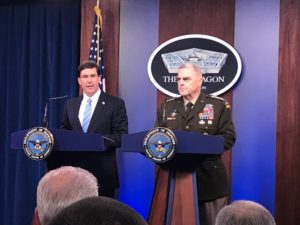Senior Pentagon officials on Thursday said the department is working to receive the Iraqi government’s permission before deploying a Patriot missile defense system to the region.
Defense Secretary Mark Esper and Army Gen. Mark Milley, the Chairman of the Joint Chiefs of Staff, told reporters they believe a Patriot battery is still required to protect U.S. troops in the wake of Iran’s recent missile attack on the al-Asad air base in Iraq.

“We need the permission of the Iraqis. That’s one issue. There may be others with regard to placement and things like that, more tactical and operational. It’s a combination of things,” Esper said. “[Marine Gen. Frank McKenzie, head of U.S. Central Command] feels he needs them. And our intent is to assess the commander’s request and determine whether we field them or not. In this case, I think we support the commander given what happened.”
The Pentagon did not have a Patriot system deployed to the area when the Jan. 8 missile attack occurred, which resulted in no casualties but at least 50 cases of traumatic brain injuries.
“In terms of if there was a Patriot battalion at al-Asad, could they have shot down these [theatre ballistic missiles]? That’s what they’re designed to do. Can’t say for certain, obviously with those altitudes and ranges, etc., if that would’ve happened. But that is exactly what they’re designed to do, to shoot down incoming theatre ballistic missiles,” Milley said.
Milley affirmed that he still believes a Patriot battery is required in the region to protect troops in the event of another Iranian attack, while adding that discussions are ongoing with the Iraqi government to work through the logistics of deploying the system.
“A Patriot battalion is not a small organization. It’s relatively large, so the mechanics of it all have to be worked out. And that is, in fact, ongoing,” Milley said.